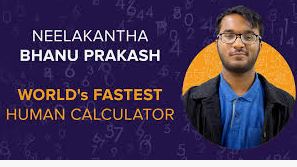Melvin Durai
How long would it take you to multiply 869,463,853 by 73? It takes 20-year-old Neelakantha Bhanu Prakash of Hyderabad just 26 seconds to produce the answer: 63,470,861,269.
It would take me about 26 minutes to do it, most of that time spent searching in the drawers of my home for a calculator.
Well, perhaps I’d do it much faster, but only because my cellphone has a calculator app. If I couldn’t use a calculator, I’d have to use a pencil and paper, as well as a quick consultation with my 14-year-old son.
Prakash, of course, does not need a calculator, nor any consultation. Known as the world’s fastest human calculator, he has trained his brain to perform calculations at an amazing speed.
“Let’s say I am doing a multiplication of 8,763 multiplied by eight,” he told CNN. “I’ll probably multiply 8,000 by eight which is 64,000, 700 by eight which is 5,600, 60 by eight which is 480, three by eight is 24. And I add all of these. But this requires the human brain to remember all this.”
The human brain is capable of remembering a lot of information. For example, I’ve trained my brain to remember many numbers (numerous numerals). The most important number that my brain remembers, of course, is my wife’s birthday.
If you are married, it is extremely important that you remember your spouse’s birthday — more important than remembering your own. During the early part of my marriage, I had to write my wife’s birthday in a date book to remember it, but eventually it became imprinted on my brain. Yes, I tattooed it to my scalp.
Remembering anniversaries is also important, whether it’s your wedding anniversary, the anniversary of India’s Independence Day, or the anniversary of that amazing day, on August 11, 2008, when Abhinav Bindra won India’s first ever individual Olympic gold medal.
When I was younger, I would also pride myself in being able to remember the phone numbers of all my friends. But I eventually got a phone that allowed me to store numbers in it, and this freed up my brain to remember all kinds of other figures, including scores from championship football games, measurements from cooking recipes, and the number of Filmfare Awards that Shahrukh Khan has won. I still manage to remember two important phone numbers: my wife’s and my mother’s.
But Prakash’s brain is on a completely different level from mine. His brain is on the 100th floor of a skyscraper, trying to glide off the balcony, while mine is on the ground floor, trying to figure out how to open the elevator door.
Prakash recently became the first Asian (and first non-European) to win gold at the Mental Calculation World Championship at the Mind Sports Olympiad (MSO) in London. The young man has been winning trophies in mathematics competitions since he was 7, but doesn’t like to be called a prodigy, even if his math ability seems prodigious.
The term “prodigy” suggests that he was born with math ability, whereas he has developed it through rigorous mental training and extraordinary perseverance that helped him overcome childhood trauma. He fractured his skull in a scooter accident when he was five and barely survived. While recuperating, he learned to play chess and challenged himself with puzzles and math problems.
“I couldn’t even go to school for a year,” he said. “All I had to rely on to get better were numbers and puzzles.”
He wants to help fight math phobia – fear of math – and has founded an organisation called Exploring Infinities that aims to help children become more comfortable with math.
Truly an inspirational figure, he has inspired me to challenge my brain a little more. From time to time, I’m going to try to do some arithmetic in my head, perhaps even calculating the number of days until my wife’s next birthday.






































